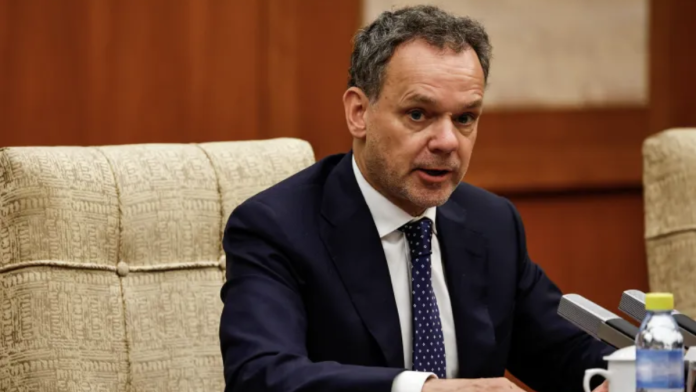Dutch Foreign Minister Caspar Veldkamp has stepped down after failing to win cabinet backing for tougher sanctions against Israel. The resignation marks a major political shock in the Netherlands, where the government is already in a fragile caretaker state. Veldkamp, a member of the New Social Contract party, had been pushing for stronger measures over Israel’s actions in Gaza.
According to his own words, he could not achieve agreement on what he called “meaningful measures”. His attempts repeatedly faced resistance from within the cabinet. Despite his efforts, many colleagues refused to move forward with additional steps.
This dispute arose as pressure grew in parliament, where opposition lawmakers demanded stricter measures against Israel. The attacks on Gaza City and settlement expansions in the West Bank added to the public debate. As frustration mounted, Veldkamp chose to resign rather than continue without support.
Sanctions and Measures Already Taken
Before his resignation, Veldkamp had already taken several steps against Israel. These included imposing entry bans on Israeli far-right ministers Bezalel Smotrich and Itamar Ben-Gvir, accusing them of encouraging violence by settlers against Palestinians.
In addition, he revoked three export permits for Dutch-made components used in Israeli navy ships. He argued that worsening conditions in Gaza increased the risk of these materials being misused. He also raised concerns about settlement expansion in areas like East Jerusalem and the controversial E1 zone.
Despite these measures, Veldkamp pushed for more. Among his goals was the suspension of the European Union’s trade agreement with Israel. But this attempt was blocked by Germany, frustrating his efforts. Many Dutch lawmakers argued that the Netherlands should not wait for a European-wide decision but act on its own.
🛑 UK blows lid on Russia’s $9.3B crypto sanctions dodge through Kyrgyzstan financial network
Even with these sanctions in place, the Netherlands has continued to support parts of Israel’s F-35 fighter jet program. Components for the jets regularly pass through the port of Rotterdam, according to research shared earlier this year. These jets have been used in airstrikes on Gaza, leading to heavy destruction and thousands of deaths.
Political Fallout and Regional Context
The resignation of Veldkamp has left the Netherlands without a foreign minister at a sensitive time. The European Union is currently dealing with multiple security and trade issues, including support for Ukraine and ongoing talks with the United States.
Shortly after the resignation, all ministers and state secretaries from Veldkamp’s New Social Contract party also announced they were leaving the caretaker government in solidarity. This move further weakens the already unstable administration, which has been in place since the collapse of the previous coalition in June.
🎓 Thousands of Aussie students storm streets, demand Israel sanctions in defiant uprising
The political crisis comes as international concern grows over the situation in Gaza. More than 62,000 people have died there since October 2023, according to humanitarian monitors. Entire neighborhoods have been destroyed, while hunger has reached critical levels. On Friday, a global hunger monitor declared that Gaza City and nearby areas are now officially facing famine conditions.
Earlier this week, the Netherlands joined over 20 countries in condemning Israel’s latest decision to expand settlements in the occupied West Bank. The joint statement described the move as “unacceptable and contrary to international law.”
For now, the Dutch caretaker government has not named a successor to Veldkamp. With elections scheduled for October, the process of forming a new coalition is expected to take months. Until then, the Netherlands will continue without a foreign minister at a time of rising tensions both at home and abroad.


